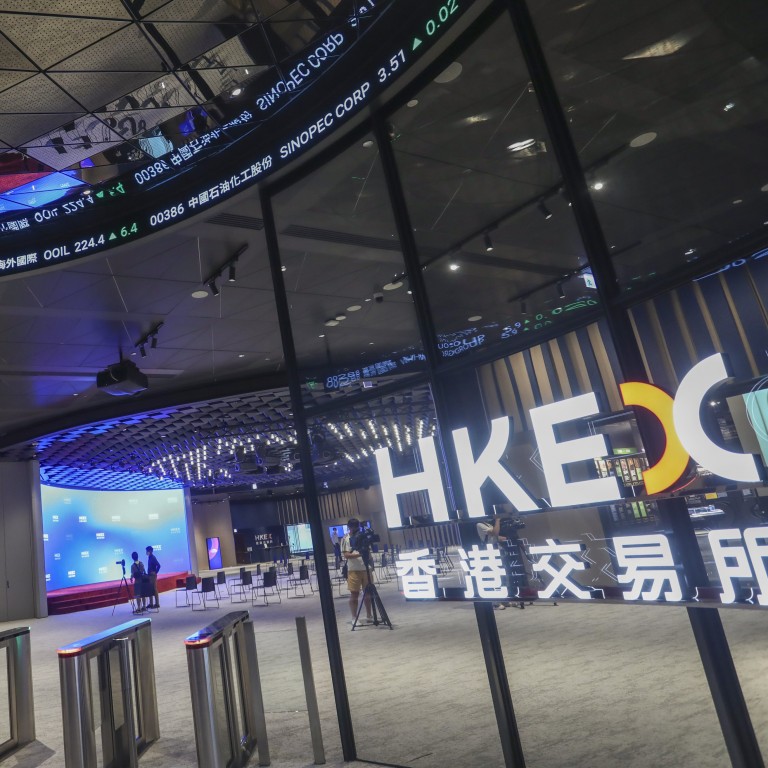
Hong Kong to let companies issue yuan-denominated shares, allow trading via Connect scheme in first half of 2023, official says
- Waiver of stamp duty will encourage brokers to act as market makers for trading of yuan-denominated shares
- HKEX will consult the market to introduce the marketmaker system in the first half of next year, paving way for trading under the Stock Connect
Hong Kong plans to let the city’s publicly traded companies issue yuan-denominated shares to provide mainland investors easier access and widen the Chinese currency’s worldwide usage, in a move that was lauded by more than a dozen companies.
“Introducing a marketmaker regime will enhance the overall efficiency and quality of the trading system of yuan stocks and promote the liquidity of these shares, and avoid the widening of spread and excessive price fluctuations caused by a lack in product liquidity,” Hui said.

The government will submit a bill to the Legislative Council (Legco) by the end of this year to change the Stamp Duty Ordinance to exempt market makers from paying stamp duty when they are providing liquidity for yuan shares.
Fifteen top Hong Kong-listed companies will explore yuan-denominated shares
“Stamp duty currently accounts for more than 90 per cent of the trading cost of securities transactions, which would add to the cost burden of market makers,” Hui said in a financial affairs meeting in the legislature (Legco) on Monday.
The waiver will encourage more brokers to be willing to take up the role, Hui said.
Bourse operator Hong Kong Exchanges and Clearing Limited (HKEX) will consult the market to establish the marketmaker system, allowing selected brokers to act as market makers and ensure liquidity for yuan-denominated shares, he said.
“Timing-wise, our target is to launch the marketmaker system for yuan shares trading for southbound Stock Connect in the first half of 2023,” Hui said.
The lawmakers who attended the meeting on Monday unanimously supported the proposed law change.
“Yuan shares trading under the Stock Connect scheme is in line with the country’s policy to promote the internationalisation of the yuan,” said Robert Lee Wai-wang, the CEO of Grand Capital Holdings, who represents the financial services sector in Legco. “The proposed law change to waive the stamp duty for the market makers will cut transaction costs and encourage turnover in yuan shares.”
Hong Kong investors gain access to US$89.6 billion in China-based ETFs
The Hong Kong government increased the stamp duty for all share transactions by 30 per cent in August 2021 to 0.13 per cent on the value of the trading for the buyer and seller.
Business sector lawmaker Jeffrey Lam Kin-fung, who also sits on the Executive Council, urged the government to further introduce more yuan investment products after the yuan shares trading scheme.
“Hong Kong needs to encourage more companies to issue yuan shares and yuan bonds to raise funds,” Lam said. “There are not many yuan-denominated products in Hong Kong. The city needs to create more yuan investment products to attract international investors to trade here.”
China to boost Hong Kong as finance hub with more cross-border stock access
Hui believes the marketmaker system will promote liquidity of trading in yuan shares, and hence encourage more companies to issue yuan shares in Hong Kong.
The Stock Connect scheme, started in 2014, allows investors to conduct cross border stock trading between Hong Kong and Shanghai, with a Shenzhen leg added two years later.
Mainland China traders trading Hong Kong stocks under the Connect scheme can only trade in Hong Kong dollars. Giving investors the option to directly trade Hong Kong stocks quoted in yuan will free them from bearing the risk of fluctuations in the offshore yuan’s spot exchange rate in Hong Kong eating into their returns.
Stock Connect: fewer market holidays for US$110 billion annual trading boost
The average daily trading volume on the southbound link of the Stock Connect was HK$41.7 billion (US$5.3 billion) last year, data from the Hong Kong stock exchange shows.


